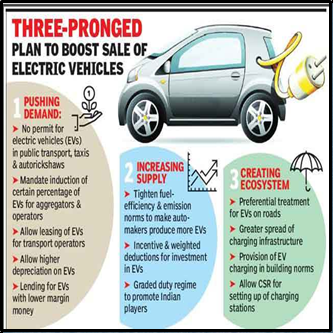INDIA URGENTLY NEEDS STANDARDISED SAFETY PROTOCOLS FOR EV CHARGING
Why in the News?
Proposed bans on EV charging in Mumbai basements highlight safety concerns, echoing similar measures in Seoul after car park explosions, driving the need for standardised safety protocols and regulatory frameworks.
source:enterclimate
About the regulation of EV Charging Infrastructure:
- The regulation and development of EV charging infrastructure in India are shared among multiple ministries, primarily the Ministry of Heavy Industries, along with the Ministries of Power and Urban Development.
- Central ministries issue broad guidelines, but state bodies like electricity regulatory commissions and urban local bodies are responsible for implementation.
- This division of responsibilities has led to inconsistencies in the implementation of charging infrastructure.
- However, states like Karnataka and Maharashtra are proactively addressing these challenges, indicating a growing awareness of the need for both central and state-level oversight.
Current Status and Safety Concerns:
- While new buildings increasingly incorporate charging points, implementation across India remains inconsistent, with the government focusing mainly on public charging.
- EV charging involves high-voltage electricity, necessitating strict adherence to safety standards, such as adequate electrical grid capacity, proper wiring thickness, fire-retardant materials, ventilation, and earthing.
- Non-compliance with these standards poses significant fire risks, particularly in challenging-to-access areas like basement parking. In response, Maharashtra’s fire services department has recommended banning EV charging in high-risk areas like parking towers and basements.
Unique Features of India’s New EV Charging Standard:
Key Government Initiatives to Promote EV Adoption:
|




